Ki Adams, World Youth Choir Foundation President
In the summer of 2020, the World Youth Choir will present a unique session as part of the Beethoven Anniversary Year (BTHVN2020) festivities celebrating the 250th anniversary of the composer’s birth. Partnering with the National Youth Orchestra of Germany (Bundesjugendorchester), the World Youth Choir will perform concerts in Germany, the Netherlands, Italy, Austria and Russia. The programme will include two major works: Beethoven’s Symphony No. 9 and Chinese contemporary composer Tan Dun’s Nine, a choral/orchestral work commissioned for the National Youth Orchestra of Germany to complement Beethoven’s ‘choral’ symphony.
Founded in 1989, the World Youth Choir exists to provide opportunities for highly skilled young singers from around the world to unite their voices to create outstanding choral singing, while at the same time transcending borders and building cultural understandings. Working with renowned conductors from countries with diverse, distinctive choral traditions, each year 60-90 singers (ages 17-26) prepare and perform a wide range of challenging choral repertoire representing a colourful spectrum of global styles, genres and traditions. This distinctive global ensemble is made possible through its founders and patrons: European Choral Association – Europa Cantat (ECA-EC), International Federation for Choral Music (IFCM), and Jeunesses Musicales International (JMI).
Since its inaugural session in 1989, the World Youth Choir has engaged over 1100 singers from more than 75 countries in 35 sessions with 47 world-class conductors. Throughout this 31-year history, rarely has the World Youth Choir had the opportunity to perform with an orchestra, making this special BTHVN2020 collaboration with the National Youth Orchestra of Germany especially innovative and exciting.
Based in Bonn, the National Youth Orchestra of Germany (BJO) is Germany’s youngest major orchestra. Founded by the German Music Council (Deutscher Musikrat) in 1969, the BJO is composed of the country’s finest young musicians between the ages of 14 and 19. In addition to Sir Simon Rattle, BJO Conductor of Honour since 2018, the orchestra has been directed by renowned conductors such as Herbert von Karajan, Kurt Masur, Gustavo Dudamel and Kirill Petrenko. In 2013 the Berlin Philharmonic Orchestra assumed the role of patron orchestra to the BJO and mentors it through joint rehearsals, masterclasses and concerts.
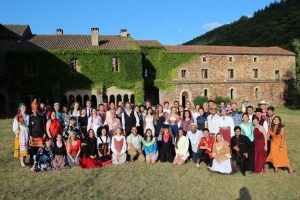
A defining experience
Both the World Youth Choir and the National Youth Orchestra of Germany prepare challenging works from all historical periods during intensive rehearsal sessions. Contemporary music and premieres of new works are essential components of both ensembles’ repertoires. Preparing these programmes, interacting musically with outstanding international conductors and working as a team with other talented and like-minded young singers/instrumentalists are defining experiences for these developing musicians at both a musical and a human level.
Common goals
Both ensembles recognise and value the fact that participation in each ensemble is an important step on the path to a professional career. The stated goals for both organisations include the development of outstanding musicians who will become cultural and social leaders of future generations.
As an orchestra for young people, the Bundesjugendorchester is a model for continually changing expectations, standards, mentalities, identities, values and goals. These changes are part of a larger context of social transformation that has led to a re-evaluation of many cultural values and institutions. We therefore see the National Youth Orchestra of Germany as an example of a primarily collective encounter with music, one that enables and encourages not only individual growth and confidence, but an expansion of artistic and societal horizons as well.
Participation in the World Youth Choir has the potential to transform lives and, in turn, the global community as singers build relationships with peers from different countries and continents, develop the choir’s own unique choral sound and become a vibrant community of change agents. Through social activities and interaction, sectional rehearsals, cultural excursions and mentorship programmes, the time spent together becomes one of deep personal and professional/artistic development.
Collaboration and community
There is no better way to celebrate the anniversary year of Beethoven’s birth than to bring together these two outstanding ensembles. Creating a microcosm of modern society, the BTHVN2020 session will provide a space in which young people can experience for themselves the particular value in embracing diversity, building community and working collaboratively to realise a collective goal. The rehearsal session and concert tour will provide a learning environment and a shared life-changing experience in which deeper cultural understandings can be explored, musical skills can be refined and personal lives can be transformed.
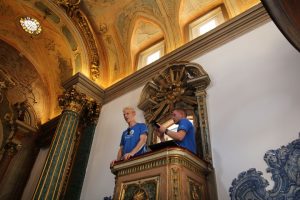
Rehearsal session and concert tour
The rehearsal session will take place in Bonn from 30 July to 7 August, when the choir and orchestra will have time to work on the concert repertoire both separately and as a combined ensemble. During this week the young people will have the opportunity not only to make music together but also to get to know their fellow musicians from other countries and explore the impact of international collaborative projects on their professional development.
Following the rehearsal session, the World Youth Choir and the National Youth Orchestra of Germany will embark on an exciting international tour of concerts from 8-20 August 2020. Performing eleven concerts in five different countries, the ensemble will be conducted by Tan Dun and Jörn Hinnerk Andresen. Tan Dun’s work Nine is a joint commission by BTHVN2020, the Royal Philharmonic Society in London and the Melbourne Symphony Orchestra.
08 August – Concert in Bonn, Germany (BTHVN2020), conducted by Tan Dun
09 August – Concert in Berlin, Germany (Young Euro Classic Festival), conducted by Tan Dun
10 August – Concert in Einbeck, Germany (Fredener Musiktage), conducted by Jörn Hinnerk Andresen
11 August – Concert in Lübeck, Germany (Schleswig-Holstein Musik Festival), conducted by Tan Dun
13 August – Concert in Amsterdam, the Netherlands (BankGiro Loterij SummerConcerts), conducted by Tan Dun
14 August – Concert in Wiesbaden, Germany (Rheingau Musik Festival), conducted by Jörn Hinnerk Andresen
15 August – Concert in Weikersheim, Germany (TauberPhilharmonie), conducted by Jörn Hinnerk Andresen
16 August – Concert in Kassel, Germany (Musiksommer Nordhessen), conducted by Jörn Hinnerk Andresen
18 August – Concert in Sterzing/Vipiteno, Italy (Brixner Initiative Musik & Kirche), conducted by Jörn Hinnerk Andresen
19 August – Concert in Vienna, Austria (Deutscher Musikrat), conducted by Jörn Hinnerk Andresen
20 August – Concert in Moscow, Russia (Moscow Philharmonic Society), conducted by Jörn Hinnerk Andresen
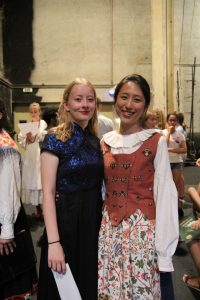
Conductors
Tan Dun, world-renowned artist and UNESCO Global Goodwill Ambassador, was born in the Hunan province of China and studied at the Central Conservatory of Music in Beijing. He later moved to New York as a doctoral student at Columbia University. He has made an indelible mark on the world’s music scene with a creative repertoire that spans the boundaries of classical music, multimedia performance and Eastern and Western traditions. A winner of today’s most prestigious honours, including the Grammy Award, Oscar/Academy Award, Grawemeyer Award, Bach Prize, Shostakovich Award, and most recently Italy’s Golden Lion Award for Lifetime Achievement, His music has been played around the world by leading orchestras, opera houses, international festivals, and on radio and television. As a conductor of innovative programmes around the world, he has led some of the world’s most esteemed orchestras, including the Royal Concertgebouw Orchestra, London Symphony Orchestra, Philadelphia Orchestra, Metropolitan Opera Orchestra, Royal Stockholm Philharmonic Orchestra, Los Angeles Philharmonic, Orchestre National de France, BBC Symphony Orchestra, Filarmonica della Scala, Münchner Philharmoniker, Orchestra dell’Accademia Nazionale di Santa Cecilia and Sydney Symphony Orchestra. Most recently, he was appointed Dean of the Bard College Conservatory of Music in New York.
Jörn Hinnerk Andresen was born in the Schleswig-Holstein region of northern Germany and studied conducting, piano and harpsichord in Dresden and Amsterdam. In addition to conducting over sixty operas, operettas and musicals, he has performed a wide repertoire of Baroque music with the Cappella Confluentes Baroque orchestra, where he is the founding conductor. Working regularly with the choir of the Vienna State Opera at the Salzburg Festival, he has frequently been invited to conduct the radio choirs of several German broadcasting stations, Danish radio and Radio France. Since February 2015 he has been the choral director of the Saxon State Opera Choir in Dresden. He is closely associated with ensembles such as Lautten Compagney Berlin, Staatskapelle Halle, Vokal Nord Tromsø, the choir of the Munich State Opera and the Batzdorfer Hofkapelle. Having been a lecturer at the Universities of Music in Cologne and Dresden and a mentor of the German Music Council in the Choral Conductors Forum, he now holds the Chair of Choral Conducting at the Mozarteum Salzburg for the winter semester 2019/20.
This is Jörn Hinnerk Andresen’s first experience with the World Youth Choir. Here are some of his thoughts about the project:
When I was asked by the board of the World Youth Choir Foundation to conduct, together with famous Chinese composer Tan Dun, a spectacular tour with Beethoven’s Ninth plus a world premiere of a work by Tan Dun, I was thrilled to be part of such a significant project. It also promised a lot of fun! So far, most of my career has involved working and dealing with professional musicians and all the associated benefits and challenges (musical, personal and psychological). The opportunity to go on a trip with almost 200 young, talented, motivated players and singers and to explore the prodigious works of two geniuses separated only by two centuries is something I am really looking forward to. What a great way to spend the summer!
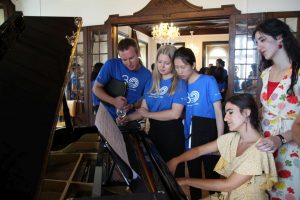
Reflections from the jury members
Chosen anew each year through a process of national and online auditions, singers are selected by an international jury whose mandate is to include singers from as many countries from the six continents as possible, balancing diversity and global representation with artistic quality. The 2020 jury consisted of Jörn Hinnerk Andresen (chair) and a jury representative from each of the three World Youth Choir Foundation patron organisations: Daniel Mestre, representing of the European Choral Association – Europa Cantat; Cristian Grases, representing the International Federation for Choral Music; and Géraldine Toutain, representing Jeunesses Musicales International. Each jury member brought their personal perspective to the process. Here is a glimpse into the experience for each jury member.
My first encounter – Jörn Hinnerk Andresen (conductor and jury chair)
From the many, many applications for the WYC, recruiters literally all over the world selected 213 singers who were then presented to our little jury of four. Every singer submitted an aria, an excerpt of her/his part from Beethoven Ninth, some examples of her/his voice range and a tricky bit of sight-reading. And this was probably the most touching thing for me in a long time. You would listen to Beethoven’s first choral line sung a cappella or with a synthesizer, with really beginner-style piano playing to veritable piano concerti in the accompaniment, some very slow and some at breakneck speed, some with crystal clear HiFi sound and some barely audible as played from an old transistor radio. The range was stunning, and yet they were all united in the desire to make music as friends, without consideration of borders, races, genders or social differences. Who would imagine that Malaysia was so far away and yet so close, that singers from Iran and Myanmar would be heard next to a German bass or a Ghanaian countertenor? Despite all the differences and all the apocalyptic predictions pouring from the media and news every day, we were overwhelmed by the deep torrent connecting so many young people all over the world, music being the one single messenger of love, hope and a bright future.
The rest really was just weighing up various social, musical and organisational questions. Would the applicants get their visa in time? Given a tour of eleven concerts in thirteen days, would the voices be stable and trained enough to cope with such a strenuous schedule? Which voices would blend or stick out? Do we have a diverse enough mixture? After all, we were looking both for enough power for the boisterous, testosterone-loaded explosions of the “Ode an die Freude” and for a nice homogenous blend for the delicate harmonies Tan Dun has given us.
We were sad for every candidate we could not consider and happy for every singer we could invite!
In the end, after two days of intensive listening we felt we had found a good mixture, taking as many nationalities as possible as well as creating a nice blend of singers. This will be a great choir!
It is still five months until we start, and I just can’t wait to get going. Naturally, performing Beethoven’s Ninth with such talented ensembles is a gift all in itself, but working with Tan Dun on his new creation, conducting his masterpiece especially commissioned for our World Youth Choir, and learning from all the young singers is something life rarely gives you. I am really grateful for the opportunity!
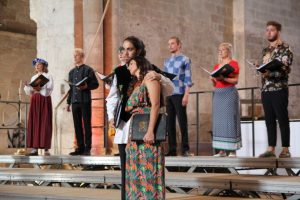
Giving back – Daniel Mestre (WYC alumnus and representing ECA-EC)
For me it was a very exciting experience to be a jury member for this WYC 2020 session! As a former member of the WYC (1993-96), to be on the other side of the panel was very interesting. Listening to several hundred audition recordings, I could imagine myself 27 years ago nervously singing “Rondo Lapponico”, the obligatory piece in 1993. It was fantastic to share this difficult and intense experience with such high-quality and talented musicians. It was a challenge to put together a well-balanced and powerful choir, but I’m very happy that my colleagues all went in the same direction as I did; it was easier than expected. I’m really proud to have helped ‘create’ such an incredible and unique instrument and to have given back a small part of everything the WYC has given to me – it’s invaluable! I’m excited to meet the singers during the summer in some of the concerts of this special tour and to put faces to all these wonderful voices! I’m absolutely convinced that all 89 of these talented young singers will never forget this amazing experience. I would love to be 25 years younger and to be able to sing the Beethoven Ninth with an incredible orchestra during the Beethoven Anniversary Year in such great venues with this unique WYC family! And even though I can’t do that, I will enjoy listening to it sitting in the audience!
Building the choir – Géraldine Toutain (representing JMI)
Travelling by train to Bonn, Germany, from Burgundy, France, for the WYC jury, I was looking through the window and following the marvellous Rhine landscape while listening to Wilhelm Furtwängler’s 1951 recording of Beethoven’s Ninth with the Bayreuth Festival Orchestra at the reopening of the Festival Theatre following the Second World War. I had already listened to the files of more than 200 singers, and I knew the hard task of choosing only about 90 of them lay ahead of us. Thoughts on Schiller’s text helped me to imagine the colour of the choir we needed to build. “Ode to joy” is something very powerful and spontaneous, but delicate as well. Looking at the castles above the banks of the Rhine, I thought that the choir should be a palace built on solid foundations (that we should try to find very ‘round’ bass voices, for instance) and plenty of rooms, each with its own character (voices from as many different countries as possible and representing the six continents), all the while able to blend together in order to create a sound full of joy and humanity, as Beethoven’s symphony demands.
That’s what we tried to do over the three days. It was a big challenge, and after some exciting and productive discussions I think we did our best. The choir is now preparing to come together for the first time in July. I will be at the first performance in Bonn to hear this hitherto ‘virtual’ choir come to life and sing the words of hope and joy in Beethoven’s Ninth.
Truly global – Cristian Grases (representing IFCM)
Being a part of the team to select the singers for the World Youth Choir is both a tremendous honour and a daunting responsibility. This stellar project has been near and dear to my heart since its inception, and I have always understood it as a choir made up of talented young artists from around the world that performs at the highest possible level. This implies that global representation has as high a priority as the level of musical talent and preparation from each singer, which makes it tricky to navigate the balance between the geographical origins of the singers and their musical abilities. As has become a tradition for the past few sessions, this year we had a large number of applications of very high calibre. Our job as the artistic committee was to put together an ensemble that would be able to represent the outstanding talent that exists around the globe. After a lengthy process that consisted of listening to all applications (sometimes multiple times) and considering the singers’ countries of origin, the jury’s decision was unanimous. We were delighted to put together a slightly larger ensemble that could tackle the technical difficulties of Beethoven’s Ninth, and at the same time include new nations that have never been represented in this project (Iran, Myanmar, Ukraine and Uzbekistan). We have no doubt that this year’s World Youth Choir is powerful both in artistic talent and world representation.
Singers
Having received and reviewed over 200 applications, the jury selected 89 singers from 42 countries to be part of the World Youth Choir 2020 session. The countries represented are Argentina, Armenia, Austria, Belgium, Brazil, Bulgaria, Canada, Colombia, Estonia, Germany, Ghana, Guatemala, Hong Kong/China, Hungary, Indonesia, Iran, Ireland, Italy, Japan, Kazakhstan, Malaysia, Mexico, Myanmar, the Netherlands, Norway, Peru, Philippines, Poland, Russia, Serbia, Slovenia, South Africa, Spain, Switzerland, Taiwan, Turkey, Ukraine, United Kingdom, United States of America, Uruguay, Uzbekistan and Venezuela. Congratulations to these singers, who represent a host of choral communities around the world.
The World Youth Choir Foundation gratefully acknowledges all its partners, recruiters, alumni and audition supervisors who helped audition singers for this year’s session. Many of these individuals are IFCM members. The recruitment process would not be possible without their invaluable help. If you are interested in becoming part of the World Youth Choir recruiting process in your country, please contact the World Youth Choir Foundation at info@worldyouthchoir.org.
Soloists
In recognition of the role that the World Youth Choir can play in the development of a professional career, the BTHVN2020 performances will feature four World Youth Choir alumni as soloists. They are Iris Hendrickx, soprano (WYC 2002, 2003, 2005); Jo-Pei Weng, mezzo-soprano (WYC 1997-2003); Xavier Moreno, tenor (WYC 1997, 1998); and Johannes Schendel, bass (WYC 1995).
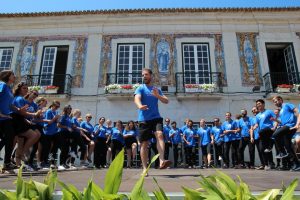
Beyond 2020
The World Youth Choir has become a global symbol of peace, unity and harmony, recognised as a UNESCO Artist for Peace (1996-1998) and performing at the Olympic Games (1992, 2008) and the Nobel Peace Prize Ceremony (2011). While the singers, conductors and locations change each year, the essence of the World Youth Choir always remains intact – a spirit of intercultural understanding, high-level musicianship and international friendships. In his book, The Ninth: Beethoven and the World in 1824, Harvey Sachs describes Beethoven’s only vocal symphony as a statement of freedom in the repressive political environment of Europe after the Congress of Vienna. Given the unsettling state of affairs in every corner of our planet (political, environmental, economic and social), we hope that the young people involved in these performances truly experience what it means to become global citizens through the medium of music.
If you are, or know of, a young, experienced singer who is looking for an extraordinary choral experience, this international project is an opportunity which you should explore. For more information about World Youth Choir sessions, visit our website (www.worldyouthchoir.org), contact us by email (info@worldyouthchoir.org), or follow the World Youth Choir on social media and watch some of our past performances on our YouTube channel (www.youtube.com/c/worldyouthchoir). In addition, the World Youth Choir Foundation is always looking for potential organisers for future WYC sessions. Contact us to find out more about how you can help host the WYC in your country.
The WYC 2021 application process will be announced in due course. In the meantime, perhaps we’ll see you at one of the World Youth Choir 2020 session concerts in August!
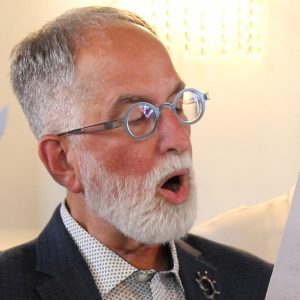 Ki Adams, a native of Birmingham, Alabama (USA), is an honourary research professor at Memorial University of Newfoundland, Canada, where he taught in the undergraduate/graduate music and music education programmes for 25 years. Currently a board member of the International Federation of Choral Music and President of the World Youth Choir Foundation, Ki is Founding Co-Director of The Singing Network, a collective for generating and producing a series of vocal and choral experiences ranging from workshops, seminars, masterclasses and dialogues to the biennial International Symposium on Singing and Song. Email: kiadams@mun.ca
Ki Adams, a native of Birmingham, Alabama (USA), is an honourary research professor at Memorial University of Newfoundland, Canada, where he taught in the undergraduate/graduate music and music education programmes for 25 years. Currently a board member of the International Federation of Choral Music and President of the World Youth Choir Foundation, Ki is Founding Co-Director of The Singing Network, a collective for generating and producing a series of vocal and choral experiences ranging from workshops, seminars, masterclasses and dialogues to the biennial International Symposium on Singing and Song. Email: kiadams@mun.ca
Edited by Christopher Lutton, UK

